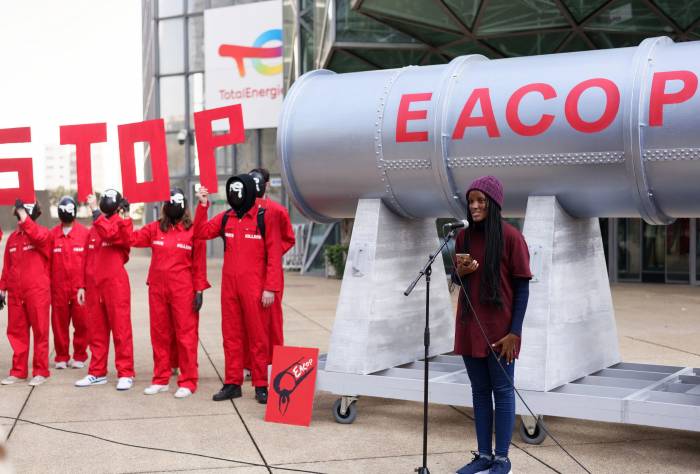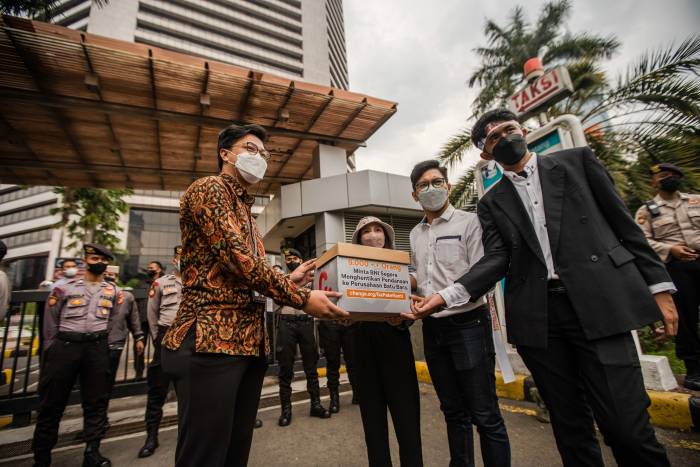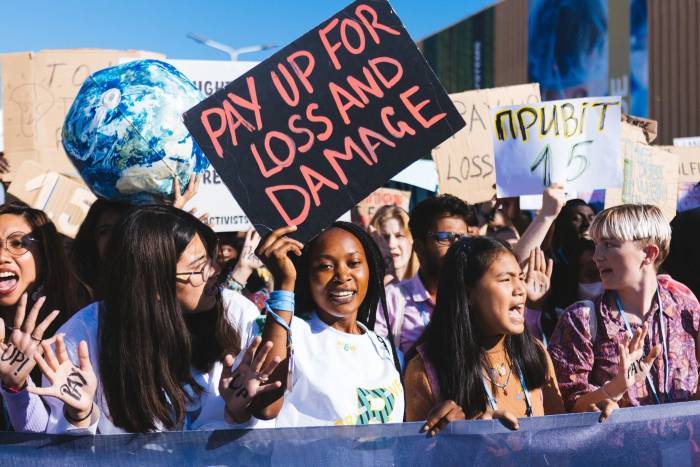
- The world stood up against the East African Crude Oil Pipeline (EACOP).
African youth, climate, and community leaders joined forces with people from Europe to North America to highlight the eco-colonialism, environmental destruction, and ongoing human rights abuses of the East African Crude Oil Pipeline (EACOP)In 2022, the #StopEACOP campaign brought voices from the frontlines of fossil fuel expansion and the climate crisis to EACOP’s financiers in Europe, and to COP27 in Egypt. Joined by activists resisting the European dash for African gas caused by Russia’s war on Ukraine, the #StopEACOP campaign made a powerful statement this year: fossil fuel expansion is NOT a viable option for our future.So far 24 banks and 18 (re)insurers have ruled out support for EACOP, and we won’t stop until the project is canceled and those resources go towards Africa’s fast, just, and equitable clean energy transition! - Fossil fuels out, renewables in: the money is starting to move.
One of 350.org’s main interests has been behind the scenes of the climate crisis: which projects contribute the most to global heating, and who pays for them?Around the world, we’ve worked with people of all ages and from across civil society to keep the pressure on banks and investors who fund the fossil fuel industry. Part of our job is to convince people who make decisions based on profitability that fossil fuels are a losing investment — and it’s working. Just a few examples:- Indonesia is the world’s largest coal exporter, but in 2022, Bank Negara Indonesia (BNI), an Indonesian state-owned bank, officially began to limit funding to coal after intense pressure from the climate movement.
- With the EACOP project putting an international spotlight on fossil fuel funding, major banks and insurers from Deutsche Bank in Germany to JP Morgan Chase in the United States publicly ruled out funding for the pipeline.
- This year’s International Energy Agency report notes that renewable energy growth spiked in 2022, and that solar power will overtake all other electricity sources in the next five years — in part because the climate movement successfully took the fossil fuel’s cries for “energy security” in the wake of Russia’s attack on Ukraine, and pivoted to the need for REAL energy security: energy that can’t be weaponized to fund war and climate chaos.

- New connections, deeper solidarity, and building power from Asia to Africa.
In order to keep up the fight for climate justice, we need to find strength and power by embracing joy and community. 2022 was a year of putting energy and time into the people who can rage with us, inspire us, and understand the emotional toll of fighting the fossil fuel industry while actively experiencing the impacts of global heating, the ongoing pandemic, food and energy shortages, and war.
Across Asia this year, artists waded through the climate crisis to display messages of solidarity in 350 Asia’s Weave of Hope project. Art is a powerful medium for inspiring change, and this work brought people from Indonesia to the Philippines together to help spread hope at the frontlines of climate chaos.
Alongside partners, 350 Africa combined music and activism with #StopEACOP Concerts on and around Africa Day and #FossilFreeVirunga Art X Activism. Both of these community events combined joy with awareness-raising about the impacts of the fossil fuel industry on local people — and by centering art, music, and human connection, they helped bridge gaps between groups across Africa and strengthened the overall movement for justice. - Global South leadership in the fight for climate justice.
Alongside civil society, 350 Africa took action around the Just Energy Transition Partnership for South Africa that was announced at COP26 last year. They’ve called for transparency and public participation to ensure this money goes towards real climate solutions that don’t repeat the inequities of the past, and are now sharing what they’ve learned with 350 Indonesia — one of the latest recipients of a JETP deal.
Brazil re-entered the climate space by electing Luiz Inacio Lula da Silva, less than a month after hosting the least-lucrative fossil fuel auction the country has ever seen. International pressure to protect traditional communities and unique ecosystems is impacting the fossil fuel industry’s ability to expand their work into places like the Amazon rainforest, and civil society across Latin America is adding to the call for climate finance that puts people before profit.
The end of the year also saw pledges for Loss and Damage finance in the final text at the UN Climate Summit COP27 thanks to Global South voices.
- Loss and Damage at COP27.
What started as a phrase that some politicians — cough cough, John Kerry of the United States — wouldn’t even say aloud became the rallying cry in Sharm El-Sheikh, after years of exhausting and often traumatic activism led by those experiencing the most severe climate impacts: rich, high-emitting countries need to pay their fair share for loss and damage while also delivering on their promises for climate finance.
And this year, pledges for the first official loss and damage fund were included in the COP27 decision.
As Joseph Zikulu, Regional Director of 350 Pacific, notes: “A fund for loss and damages in the final text [of COP27] is a clear result from the pressure from the most impacted nations and the civil society.”
There’s much work to be done, from ensuring that nations committed to contributing to the fund actually pay up, to making it clear and easy for people in need to access this money. But it’s a victory worth celebrating as we go into 2023 ready to fight for the best possible implementation, as well as for real climate finance and the just, community-led solutions the world needs.